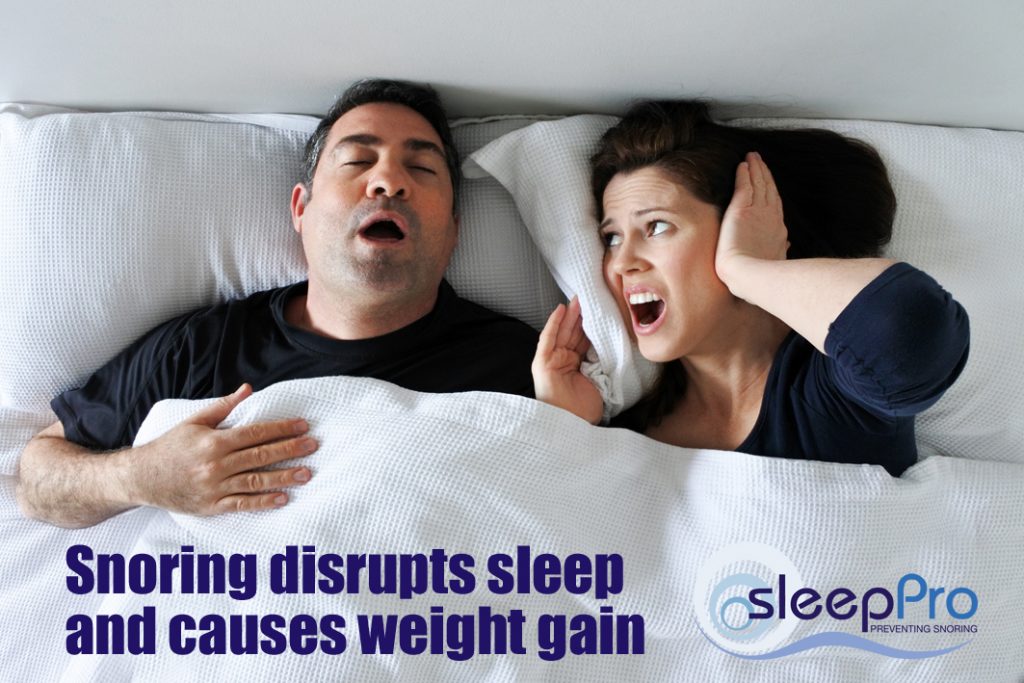
Lack of sleep makes you put on weight and that makes you snore
Share
In fact it’s a vicious circle because if you snore you will suffer from disturbed sleep causing further weight gain that will make your snoring worse. Don’t forget the disturbed night that it causes for your partner with the same result. The two-pronged solution is to stop snoring and also control your weight.

It seems simple but having the right amount of quality sleep is important – in fact it’s vital. A simple thing – but there can be complex problems as a result.
New findings published by the National Diet and Nutrition Survey add to the growing body of evidence that shows just how important a good night’s sleep is to health. Adults in the UK who have poor sleep patterns are more likely to be overweight and obese and have poorer metabolic health, according to the new study.
The findings showed that people who were sleeping an average of only six hours a night had a waist measurement that was 3 cm greater than that of individuals who were getting nine hours of sleep a night. In addition, shorter sleepers were also heavier as well.
The study involved 1,615 adults who reported how long they slept and kept records of food intake. Participants had blood samples taken and their weight, waist circumference, and blood pressure recorded. The researchers looked at the associations between how long people were sleeping and these key biological parameters.
The results strengthen the evidence that insufficient sleep could contribute to the development of metabolic diseases such as diabetes – just one of the major health challenges facing the NHS in Britain and also other countries.
The study was led by Dr Laura Hardie, Reader in Molecular Epidemiology at the University of Leeds – not only looked at the links between sleep duration, diet and weight, but also other indicators of overall metabolic health such as blood pressure, blood cholesterol, blood sugar, and thyroid function.
The Leeds researcher said: “The number of people with obesity worldwide has more than doubled since 1980. Obesity contributes to the development of many diseases most notably type 2 diabetes. Understanding why people gain weight has crucial implications for public health.”
Snoring is a key factor in all these situations as far as health is concerned, and it has also been proved that it is closely related to a much higher risk of cardio-vascular problems such as strokes and heart attacks.
Shorter sleep was also linked to reduced levels of HDL cholesterol in the participants’ blood and this is another factor that can cause health problems. HDL cholesterol is ‘good’ cholesterol that helps remove ‘bad’ fat from the circulation. In doing so, high HDL cholesterol levels protect against conditions such as heart disease and snoring disrupts its development.
Interestingly, the study did not find any relationship between shortened sleep and a less healthy diet – a fact that surprised the researchers. Other previous studies have suggested that shortened sleep can lead to poor dietary choices and excessive snacking.
The research was a snapshot of the associations between sleep duration and measurements of metabolic health. It was not designed to assess the impact of chronic poor sleep over time, and whether that leads to disease but other reports have assessed this and proved the relationship.
Dr Laura Hardie, the study’s senior investigator, added: “Because we found that adults who reported sleeping less than their peers were more likely to be overweight or obese, our findings highlight the importance of getting enough sleep. How much sleep we need differs between people, but the current consensus is that seven to nine hours is best for most adults.”
Stopping snoring is a key factor in maintaining good health and it’s both easy and important to prevent the problem. Simple inexpensive oral appliances, worn during sleep, prevent snoring in almost all cases. SleepPro oral appliances have been tested by the NHS in Britain and are strongly recommended by the NHS as first recommendation to all patients who suffer from snoring or the more dangerous problem of obstructive sleep apnoea.
John Redfern

